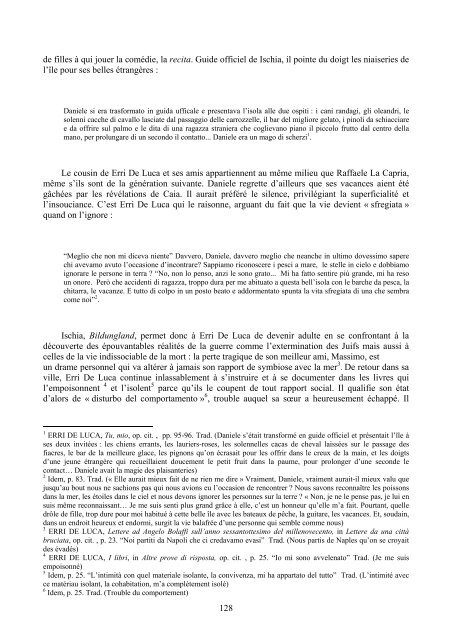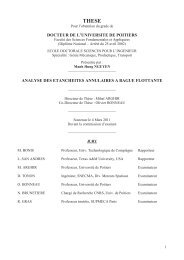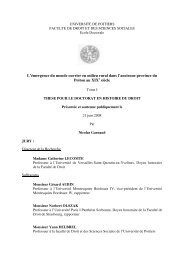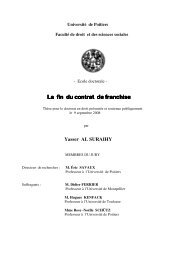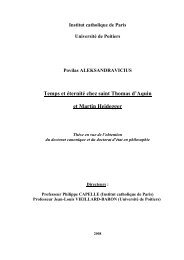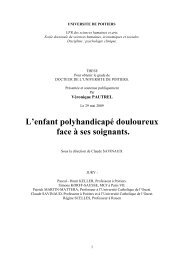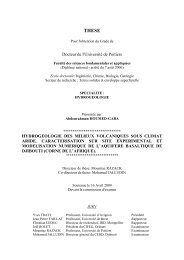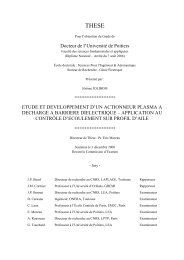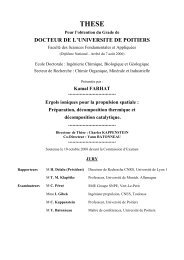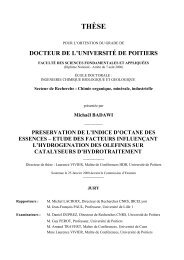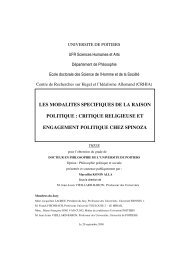Consulter le texte intégral de la thèse - Université de Poitiers
Consulter le texte intégral de la thèse - Université de Poitiers
Consulter le texte intégral de la thèse - Université de Poitiers
You also want an ePaper? Increase the reach of your titles
YUMPU automatically turns print PDFs into web optimized ePapers that Google loves.
<strong>de</strong> fil<strong>le</strong>s à qui jouer <strong>la</strong> comédie, <strong>la</strong> recita. Gui<strong>de</strong> officiel <strong>de</strong> Ischia, il pointe du doigt <strong>le</strong>s niaiseries <strong>de</strong><br />
l’î<strong>le</strong> pour ses bel<strong>le</strong>s étrangères :<br />
Danie<strong>le</strong> si era trasformato in guida uffica<strong>le</strong> e presentava l’iso<strong>la</strong> al<strong>le</strong> due ospiti : i cani randagi, gli o<strong>le</strong>andri, <strong>le</strong><br />
so<strong>le</strong>nni cacche di cavallo <strong>la</strong>sciate dal passaggio <strong>de</strong>l<strong>le</strong> carrozzel<strong>le</strong>, il bar <strong>de</strong>l migliore ge<strong>la</strong>to, i pinoli da schiacciare<br />
e da offrire sul palmo e <strong>le</strong> dita di una ragazza straniera che coglievano piano il piccolo frutto dal centro <strong>de</strong>l<strong>la</strong><br />
mano, per prolungare di un secondo il contatto... Danie<strong>le</strong> era un mago di scherzi 1 .<br />
Le cousin <strong>de</strong> Erri De Luca et ses amis appartiennent au même milieu que Raffae<strong>le</strong> La Capria,<br />
même s’ils sont <strong>de</strong> <strong>la</strong> génération suivante. Danie<strong>le</strong> regrette d’ail<strong>le</strong>urs que ses vacances aient été<br />
gâchées par <strong>le</strong>s révé<strong>la</strong>tions <strong>de</strong> Caia. Il aurait préféré <strong>le</strong> si<strong>le</strong>nce, privilégiant <strong>la</strong> superficialité et<br />
l’insouciance. C’est Erri De Luca qui <strong>le</strong> raisonne, arguant du fait que <strong>la</strong> vie <strong>de</strong>vient « sfregiata »<br />
quand on l’ignore :<br />
“Meglio che non mi diceva niente” Davvero, Danie<strong>le</strong>, davvero meglio che neanche in ultimo dovessimo sapere<br />
chi avevamo avuto l’occasione d’incontrare? Sappiamo riconoscere i pesci a mare, <strong>le</strong> stel<strong>le</strong> in cielo e dobbiamo<br />
ignorare <strong>le</strong> persone in terra ? “No, non lo penso, anzi <strong>le</strong> sono grato... Mi ha fatto sentire più gran<strong>de</strong>, mi ha reso<br />
un onore. Però che acci<strong>de</strong>nti di ragazza, troppo dura per me abituato a questa bell’iso<strong>la</strong> con <strong>le</strong> barche da pesca, <strong>la</strong><br />
chitarra, <strong>le</strong> vacanze. E tutto di colpo in un posto beato e addormentato spunta <strong>la</strong> vita sfregiata di una che sembra<br />
come noi” 2 .<br />
Ischia, Bildung<strong>la</strong>nd, permet donc à Erri De Luca <strong>de</strong> <strong>de</strong>venir adulte en se confrontant à <strong>la</strong><br />
découverte <strong>de</strong>s épouvantab<strong>le</strong>s réalités <strong>de</strong> <strong>la</strong> guerre comme l’extermination <strong>de</strong>s Juifs mais aussi à<br />
cel<strong>le</strong>s <strong>de</strong> <strong>la</strong> vie indissociab<strong>le</strong> <strong>de</strong> <strong>la</strong> mort : <strong>la</strong> perte tragique <strong>de</strong> son meil<strong>le</strong>ur ami, Massimo, est<br />
un drame personnel qui va altérer à jamais son rapport <strong>de</strong> symbiose avec <strong>la</strong> mer 3 . De retour dans sa<br />
vil<strong>le</strong>, Erri De Luca continue in<strong>la</strong>ssab<strong>le</strong>ment à s’instruire et à se documenter dans <strong>le</strong>s livres qui<br />
l’empoisonnent 4 et l’iso<strong>le</strong>nt 5 parce qu’ils <strong>le</strong> coupent <strong>de</strong> tout rapport social. Il qualifie son état<br />
d’alors <strong>de</strong> « disturbo <strong>de</strong>l comportamento » 6 , troub<strong>le</strong> auquel sa sœur a heureusement échappé. Il<br />
1<br />
ERRI DE LUCA, Tu, mio, op. cit. , pp. 95-96. Trad. (Danie<strong>le</strong> s’était transformé en gui<strong>de</strong> officiel et présentait l’î<strong>le</strong> à<br />
ses <strong>de</strong>ux invitées : <strong>le</strong>s chiens errants, <strong>le</strong>s <strong>la</strong>uriers-roses, <strong>le</strong>s so<strong>le</strong>nnel<strong>le</strong>s cacas <strong>de</strong> cheval <strong>la</strong>issées sur <strong>le</strong> passage <strong>de</strong>s<br />
fiacres, <strong>le</strong> bar <strong>de</strong> <strong>la</strong> meil<strong>le</strong>ure g<strong>la</strong>ce, <strong>le</strong>s pignons qu’on écrasait pour <strong>le</strong>s offrir dans <strong>le</strong> creux <strong>de</strong> <strong>la</strong> main, et <strong>le</strong>s doigts<br />
d’une jeune étrangère qui recueil<strong>la</strong>ient doucement <strong>le</strong> petit fruit dans <strong>la</strong> paume, pour prolonger d’une secon<strong>de</strong> <strong>le</strong><br />
contact… Danie<strong>le</strong> avait <strong>la</strong> magie <strong>de</strong>s p<strong>la</strong>isanteries)<br />
2<br />
I<strong>de</strong>m, p. 83. Trad. (« El<strong>le</strong> aurait mieux fait <strong>de</strong> ne rien me dire » Vraiment, Danie<strong>le</strong>, vraiment aurait-il mieux valu que<br />
jusqu’au bout nous ne sachions pas qui nous avions eu l’occasion <strong>de</strong> rencontrer ? Nous savons reconnaître <strong>le</strong>s poissons<br />
dans <strong>la</strong> mer, <strong>le</strong>s étoi<strong>le</strong>s dans <strong>le</strong> ciel et nous <strong>de</strong>vons ignorer <strong>le</strong>s personnes sur <strong>la</strong> terre ? « Non, je ne <strong>le</strong> pense pas, je lui en<br />
suis même reconnaissant… Je me suis senti plus grand grâce à el<strong>le</strong>, c’est un honneur qu’el<strong>le</strong> m’a fait. Pourtant, quel<strong>le</strong><br />
drô<strong>le</strong> <strong>de</strong> fil<strong>le</strong>, trop dure pour moi habitué à cette bel<strong>le</strong> î<strong>le</strong> avec <strong>le</strong>s bateaux <strong>de</strong> pêche, <strong>la</strong> guitare, <strong>le</strong>s vacances. Et, soudain,<br />
dans un endroit heureux et endormi, surgit <strong>la</strong> vie ba<strong>la</strong>frée d’une personne qui semb<strong>le</strong> comme nous)<br />
3<br />
ERRI DE LUCA, Lettere ad Angelo Bo<strong>la</strong>ffi sull’anno sessantottesimo <strong>de</strong>l mil<strong>le</strong>novecento, in Lettere da una città<br />
bruciata, op. cit. , p. 23. “Noi partiti da Napoli che ci credavamo evasi” Trad. (Nous partis <strong>de</strong> Nap<strong>le</strong>s qu’on se croyait<br />
<strong>de</strong>s évadés)<br />
4<br />
ERRI DE LUCA, I libri, in Altre prove di risposta, op. cit. , p. 25. “Io mi sono avve<strong>le</strong>nato” Trad. (Je me suis<br />
empoisonné)<br />
5<br />
I<strong>de</strong>m, p. 25. “L’intimità con quel materia<strong>le</strong> iso<strong>la</strong>nte, <strong>la</strong> convivenza, mi ha appartato <strong>de</strong>l tutto” Trad. (L’intimité avec<br />
ce matériau iso<strong>la</strong>nt, <strong>la</strong> cohabitation, m’a complètement isolé)<br />
6<br />
I<strong>de</strong>m, p. 25. Trad. (Troub<strong>le</strong> du comportement)<br />
128


